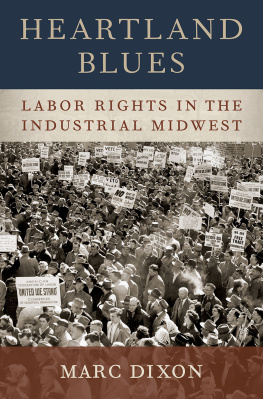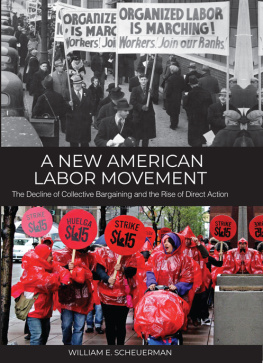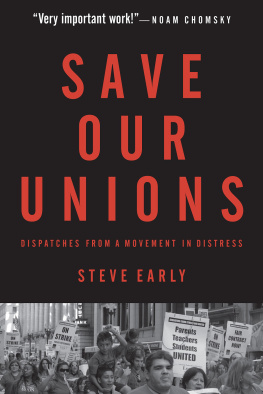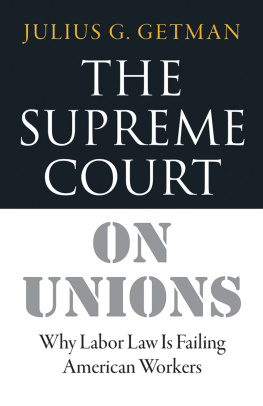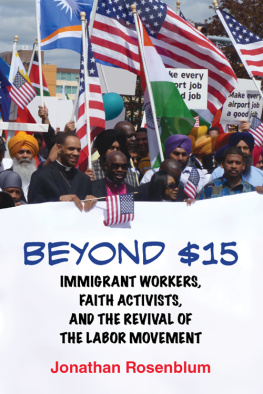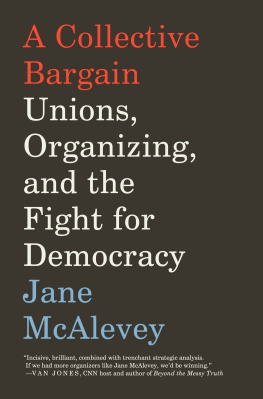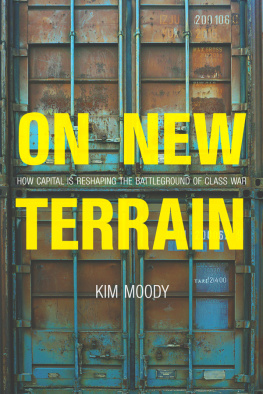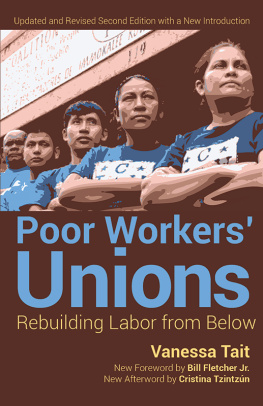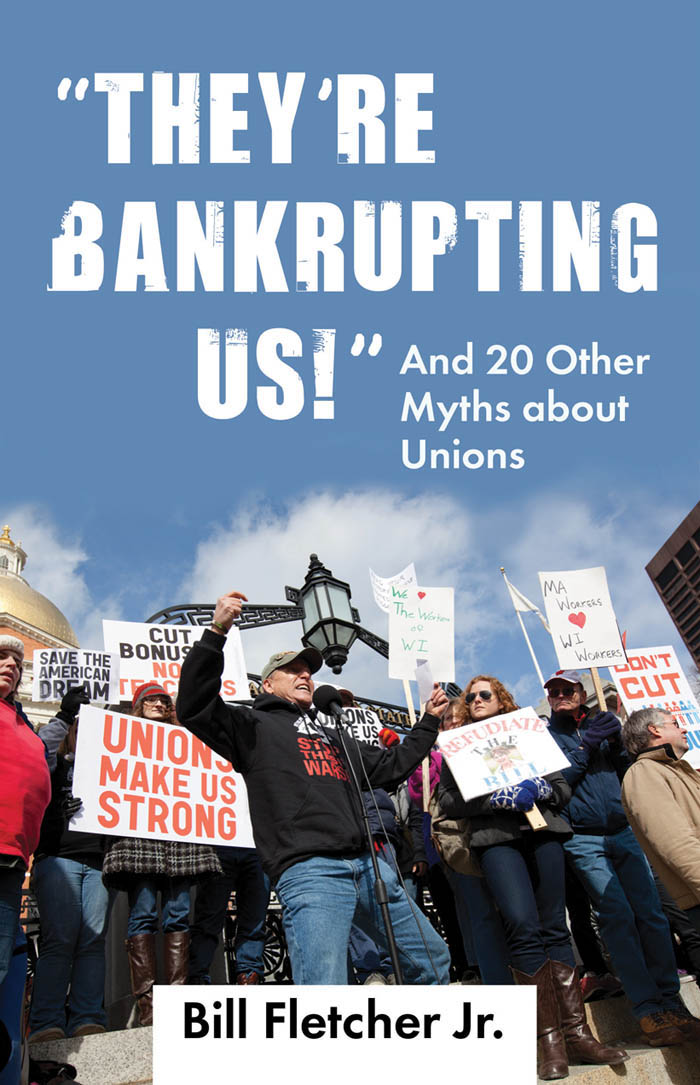Praise for Theyre Bankrupting Us!
As someone who has written about the daily lives and struggles of working people, I am constantly impressed and enlightened by Bill Fletchers work. In Theyre Bankrupting Us!, he answers the question of why unions are so essentialnot just for economic uplift but for democracy itself. Fletcher is one of our leading labor intellectuals, and once again, he has the last word on a subject of central importance to all Americans.
Barbara Ehrenreich, author of Nickel and Dimed: On (Not) Getting By in America
Coming from a union family helped shape who I am today. Unions have been critical for African Americans, and for all working people, and are essential for social justice. Read Bill Fletchers important and timely book so we can reassert the humanity of working people and help them stand against the larger societal forces that are trying to crush them.
Danny Glover, actor/activist
Its amazing how much nonsense about unions is believed, and how little is really known about their purpose and proud history. Bill Fletcher sets the record straight, and he tells us a thrilling story while doing it. A thriving union movement is crucial to the well-being of working men and women and to the overall health of our democratic way of life. This bookbetter than any other Ive readexplains why.
Bob Herbert, Distinguished Senior Fellow at Demos and former New York Times op-ed columnist
Bill Fletchers new book is a must-read for every worker in America. Full of surprising stories and useful facts, Theyre Bankrupting Us! uncovers everything we ever wanted to know about how unions work and the true role that unions have played in shaping the nature of our work today.
Ai-jen Poo, director, National Domestic Workers Alliance
Isnt it curious that the loudest, most venomous voices against unions are the CEOs and Wall Streeters who profit by keeping Americas working families down and unions out? In this powerful book, Bill Fletcher exposes their self-serving lies and points out the obvious: unions work. Not only do they advance our economy but also our democracy and our nations historic pursuit of social justice.
Jim Hightower, author, radio commentator, public speaker, and editor of the Hightower Lowdown
Even before I read Bill Fletchers new book, I knew it was a must-read. Having read it now, my instincts have been confirmed. Bill Fletcher is a brilliant thinker in Ella Bakers tradition. He is an organizer extraordinaire who writes from thirty years experience in labor and freedom movements. Theyre Bankrupting Us! speaks to a very broad audience about the diversity, complexity, and vitality of the United States labor movement. And who better to tell that story and teach that lesson than this amazing intellectual, committed activist, and tireless movement teacher?
Barbara Ransby, professor, University of Illinois at Chicago, and author of Ella Baker and the Black Freedom Movement
THEYRE BANKRUPTING US!
And 20 Other Myths about Unions
BILL FLETCHER JR.
BEACON PRESS
BOSTON
This book is dedicated to my parents:
JOAN C. FLETCHER AND THE LATE WILLIAM G. FLETCHER SR.
The fight for social justice will always be part of the Fletcher household.
CONTENTS
INTRODUCTION
There comes a time in any war where one side or the other makes a gamble that the moment has arrived for what is known as the final offensive. In some cases, there has been a long stalemate, while in others one side simply feels that it is strategically positioned to finish off their adversary. In a final offensive, there is an all-out mobilization aimed at eliminating the opponent or of so crippling them that they have no alternative but to surrender.
There has been an ongoing war against working people and unions both within the United States and globally. This war revolves around power and the distribution of wealth. From the moment unions emerged in the United States in the early nineteenth century, the forces of wealth and business have largely been arrayed against unionization efforts, seeing in them mechanisms that could potentially weaken their power over workers. In fact, the history of labor/business relations in the United States has been the bloodiest of any advanced industrial country, mostly because of the extent to which efforts at worker self-organization have been repressed by the forces of business, often through brute force.
In the postWorld War II era, organized labor believed it had achieved a modus vivendi, an agreement to disagree, with major sections of the business community, primarily in the North, Midwest, and on the West Coast. Yet, for a variety of reasons that we will explore, organized labor ceased to grow and instead entered what was initially a slow and then a steady decline. After 1980, that slow but steady decline accelerated into a drop of catastrophic proportions. Despite this, many leaders of organized labor refused to accept the ramifications of the situation and adjust course. Largely this is what is meant when someone speaks of a crisis of organized labor today.
The final offensive against organized labor was fully launched in the aftermath of Wisconsin governor Scott Walkers proposed cut of collective bargaining rights and the subsequent nationwide protests in March 2011. Its important to appreciate that this attack, underway for decades, began anew when Ronald Reagan was elected president in 1980. Prior to Reagans victory, there were individuals and factions within the Republican Party that accepted at least some elements of the New Deal reforms of the 1930s, and generally, if grudgingly, accepted the existence of labor unions. What changed with Reagan was the Republican philosophy on the economy and, with that, the approach to be taken toward labor unions.
What Reagan, Reaganism, and what came to ultimately be known as neoliberalism represented was a complete rejection of the role of government as an instrument for the fair distribution of wealth in order to address the unfortunate, the unemployed, the underemployed, and the disregarded. Also contained in the logic of this philosophy was both the notion that anything that represented an obstacle to the accumulation of profits should be removed, and that individuals shouldnt concern themselves with the collective good, and should only think about number 1. In the early stages of neoliberalism, the focus was on government-controlled industries, government functions that the private sector sought, and government regulations that the private sector wished to eliminate. In time, obstacles to the accumulation of profits more clearly came to include organizations of workers and farmersthat is, organizations that sought to equalize wealth and bring about economic justice, if not social justice. Organized labor constituted a major obstacle to their agenda as far as the proponents of neoliberalism were concerned.
Despite the fact that US unions never represented more than 35 percent of the nonagricultural workforcea considerable percentage by todays standardsunions were nevertheless a part of the so-called mainstream. Therefore, to move against unions there needed to beagain utilizing a military analogya softening-up operation. In other words, a direct attack on the very existence of unions would not be efficacious, at least initially, so the proponents of neoliberalism began to ideologically challenge the relevance and appropriateness of labor unions by sowing confusion and misinformation among the general public. This was accompanied by an increased hostility by employers at both the bargaining table and in places where workers chose to join or form labor unions (including but not limited to the National Labor Relations Board union certification elections).


